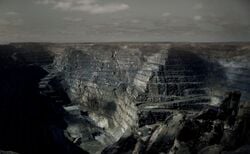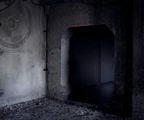Bliss: Difference between revisions
From Halopedia, the Halo wiki
Postmortem (talk | contribs) mNo edit summary |
mNo edit summary |
||
| (2 intermediate revisions by the same user not shown) | |||
| Line 24: | Line 24: | ||
==Overview== | ==Overview== | ||
===Environmental features=== | ===Environmental features=== | ||
Thirty-two years after Bliss was glassed by the Covenant, its surface was a hazardous slog of [[lechatelierite]] glasslands, with jutting fragments capable of cutting through bone and violent storms kicking up black walls of particulates that required prospectors and terraformers to shelter-in-place multiple times per week. The fine ash suspended in its atmosphere prevented ecosystem recovery. | Thirty-two years after Bliss was glassed by the Covenant, its surface was a hazardous slog of [[lechatelierite]] glasslands, with jutting fragments capable of cutting through bone and violent storms kicking up black walls of particulates that required prospectors and terraformers to shelter-in-place multiple times per week. The fine ash suspended in its atmosphere prevented ecosystem recovery. Its climate was exceptionally dry, with constant water breaks doing little to stave off thirst for humans traveling the surface by foot.{{Ref/Reuse|htt11}} | ||
===Ecology=== | ===Ecology=== | ||
Latest revision as of 05:43, October 2, 2024
| Bliss | |
|---|---|
| Astrographical | |
|
System: |
|
|
Moon(s): |
|
| Societal | |
|
Species: |
Human (Non-native) |
|
Population: |
|
|
Colonized: |
|
|
Government: |
|
Bliss was a human Outer colony world[Note 1] governed by the Unified Earth Government in the Faelith system.[1] Its capital was Manikata.[3] Bliss was orbited by at least one natural satellite, Aires.[2]
Overview[edit]
Environmental features[edit]
Thirty-two years after Bliss was glassed by the Covenant, its surface was a hazardous slog of lechatelierite glasslands, with jutting fragments capable of cutting through bone and violent storms kicking up black walls of particulates that required prospectors and terraformers to shelter-in-place multiple times per week. The fine ash suspended in its atmosphere prevented ecosystem recovery. Its climate was exceptionally dry, with constant water breaks doing little to stave off thirst for humans traveling the surface by foot.[4]
Ecology[edit]
Bright blue and red desert plants had begun to push through the glass by 2558.[4]
The only non-human life reported on the planet thirty-two years after its glassing was a species of crow, picking through landfills around the remaining settlements.[4]
Locations[edit]
History[edit]
Human-Covenant War[edit]
- Main article: Battle of Bliss
On February 13, 2526, a fleet of 45 Covenant vessels, including five assault carriers, 23 battlecruisers, and 17 destroyers, entered the planet's system.[5] Office of Naval Intelligence operatives on Bliss had apparently learned of the Covenant's inevitable assault and fled the planet. Although the agents of the planet's communications relay took all items of value from the facility with them, they left behind an active communications server, likely assuming the entire station would be destroyed.[4] Three UNSC ships, including the heavy cruisers UNSC Weeping Willows and UNSC Matador, as well as the frigate UNSC Purpose, engaged the Covenant fleet. The battle lasted about three minutes and resulted in the glassing of the colony.[2]
The destruction of Bliss later led to dissident leaders among the Outer Colonies agreeing to peace with the UNSC.[6]
Professor Ellen Anders of Rishard University on Arcadia noted that Bliss, Cote d'Azure, and Onyx had "large-scale engineered features", suggesting the presence of Forerunner structures on the planet.[7]
Post-war[edit]
After the Human-Covenant War, a silicate mining settlement was established on Bliss, surrounded by numerous quarries.[4]
By 2558, Bliss had not yet been reterraformed by humanity and was now charted in a sector on the outskirts of human space. In that year, a signal emanated from Bliss. The signal was picked up by a source of reporter Petra Janecek's, whom then instructed journalist Benjamin Giraud to discover the signal's source before it was detected by the Unified Earth Government.[8] Gaining passage aboard a mining freighter, Giraud traveled to Bliss and ventured out into the planet's glasslands. He eventually came across the relatively intact communications relay station that had survived the glassing of Bliss. Inside the facility, he discovered the active communications server that had recorded all ONI records over the years. Taking files from the server, Giraud intended to use them to bring down ONI.[4]
Government and society[edit]
The planet and its system was protected by the Bliss Defense Fleet.[2] Bliss was home to an Office of Naval Intelligence subspace communications relay that allowed for superluminal communications.[4]
Trivia[edit]
Intersystem News reported that an estimated 500 million people were feared dead after the glassing of Bliss. This contradicts the data pads in Halo: Reach, which put all human casualties in the Human-Covenant War by 2530 at 62,154,022.
Gallery[edit]
An Intersystem News report on the Battle of Bliss
List of appearances[edit]
- Halo Wars: Genesis (First appearance)
- Halo: Reach
- Data pads (Mentioned only)
- Dr. Halsey's personal journal (Mentioned only)
- Hunt the Truth
Notes[edit]
Sources[edit]
- ^ a b c Halo Encyclopedia (2022 edition), page 50
- ^ a b c d Dr. Halsey's personal journal - The Accra Incident
- ^ a b Dr. Halsey's personal journal - Intersystem News
- ^ a b c d e f g Hunt the Truth, Episode 11: DOWN TO THE BONE
- ^ Dr. Halsey's personal journal "The Accra Incident": "Unknown ships positively identified as alien warships comprising what appear to be five assault carriers, twenty-three battlecruisers, and seventeen destroyers."
- ^ Halo: Reach Limited Edition, Dr. Halsey's Personal Journal, April 28, 2526
- ^ Halo Wars: Genesis
- ^ Hunt the Truth, Episode 10: GAG ORDER

